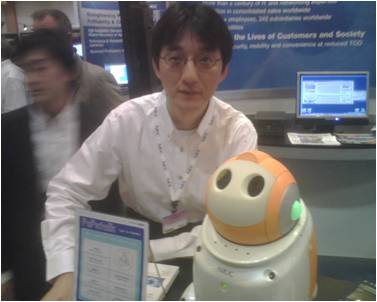Dr. Yoshihiro Fujita from NEC Corporation’s Enterprise Solutions Planning Division demonstrated PaPeRo, NEC’s entry into the humanoid robot marketplace yesterday at the Symposium / ITXpo conference in Orlando. Robot Central sat down with Dr. Fujita to discuss his research and NEC’s robot strategy.
 Dr. Fujita is a computer vision and speech recognition expert from NEC who has spent the last 10 years applying these technologies to the robotics space. His new creation is PaPeRo – short for Partner Personal Robot. PaPeRo is a simplistically designed and very friendly Japanese speaking bot. He understands a host of Japanese phrases and commands and responds appropriately. Mechanically, he is controlled by 4 motors, 2 in his head and 2 in his body. He has a series of sensors embedded to recognize touch, and he also has stereoscopic vision with a CCD camera in each eye. Dr. Fujita commented that the robot has been trained to learn and recognize specific faces for a personalized experience.
Dr. Fujita is a computer vision and speech recognition expert from NEC who has spent the last 10 years applying these technologies to the robotics space. His new creation is PaPeRo – short for Partner Personal Robot. PaPeRo is a simplistically designed and very friendly Japanese speaking bot. He understands a host of Japanese phrases and commands and responds appropriately. Mechanically, he is controlled by 4 motors, 2 in his head and 2 in his body. He has a series of sensors embedded to recognize touch, and he also has stereoscopic vision with a CCD camera in each eye. Dr. Fujita commented that the robot has been trained to learn and recognize specific faces for a personalized experience.
PaPeRo is designed as personal robot platform to perform a variety of tasks. The bot currently represents NEC’s only investment in robotics. Dr. Fujita indicated that PaPeRo is in limited field testing in a variety of scenarios:
- Elderly Care: PaPeRo has been tested as a companion for the elderly. As both a friend and a monitor, PaPeRo can provide simple conversation as well as reminders and monitoring of the lonely and homebound. In fact, Fujita commented that the bot had conducted sing-a-longs with the elderly. Through it’s wireless internet connectivity, PaPeRo can also act as a telepresence robot for remote visits from relatives, friends or care-givers.
- Young Child Education: NEC has tested PaPeRo in nursery school and kindergarten environments. The robot has been programmed with educational games that hold the children’s attention and concentration for prolonged periods. New content can be uploaded by educators through the web allowing for an evolving educational experience.
- Receptionist: PaPeRo has worked as a front desk receptionist, assisting office visitors to contact employees.
For both the elderly and children, Dr. Fujita maintains that physical presence is important. He believes that the synergy of personal robotics hardware with immersive software will help bridge some of the current gaps of technology usage.
Currently, PaPeRo is still in prototype at a cost of $10,000 USD per unit. Dr. Fujita could not provide a commercialization time-frame for either Japan or US markets. He did note that NEC was shooting for a price point “comparable to that of a laptop” at volumes of 100,000 units per year.
Looking ahead to the next 10 years, Dr. Fujita sees an explosion in personal and home robotics. Today he feels the human-robot interface, especially in the speech recognition domain, is limiting adoption, but he is driving NEC research in this area. He believes that a home robot will serve as orchestrator for home activities, passing messages between busy family members, helping with tech support on other technology products, serving in a telepresence capacity for extended family and friends and ultimately acting as a trusted agent, both in the physical world and with its own avatar online.
100,000 robots at $2000 per unit is a $200 million annual business. The coming wave of personal robots will create a marketplace that companies like NEC won’t want to miss.
Links:
- NEC Personal Robotics Research
- PaPeRo robot videos on YouTube
- Gartner Symposium


